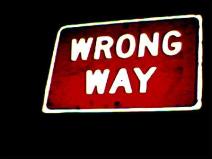Citizen journalism might try to kill you


One of my biggest frustrations with this notion of people taking reporting into their own hands is the lack of fact-checking and journalistic integrity that comes with it. Not only could it hurt a potential subject or company, i.e. Jobs and Apple, but it can discredit the news agency that proliferates the incorrect message. Yes, even CNN.
The expansion of social media and "blogs" has created more avenues by which we can all communicate, which is great. However, it's also created more opportunities for error. How do we know what is true? And how do we put measurs into effect that better police this content before it goes out?
It appears that some people might be more interested in breaking a story rather than confirming that their facts are accurate. That is a dangerous practice. Is it really worth the page views to create a liability to yourself or the news organization you may drag into this?
We're a society where people are famous for being famous. Young attractive women picking their nose on YouTube can bring 100,000 page views or even a sponsorship contract. Our information priorities are out of whack and we need to get them back on track. There need to be some checks and balances. Plus, anonymous reporting or blogging should just not be tolerated.
Interestingly timed, I received an email this week from a company called gooseGrade, which both enables citizen journalism and also calls its accuracy into question. Writers can install gooseGrade on their blogs and open themselves up to fact-checking and even spelling and grammatical corrections from the readers at large. Bloggers can choose whether or not to take the proposed changes from readers and readers are kept honest by being assigned their own grades that reflect how accurate they really were (rather than just being snooty grammar police).
In theory, I think gooseGrade is onto something. With so many bloggers at large spewing their opinions (like me) and doing copy-paste blogging and not checking their content before publishing, it's no wonder we have so much confusion in getting together as a community, and say, try to elect a president?
Citizen journalists, please be careful. You almost put Jobs in ICU. Let's not do that with anyone else.